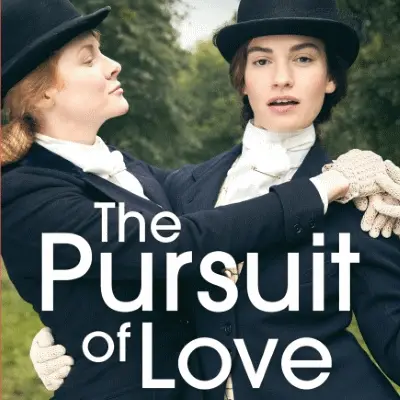Emily Mortimer's The Pursuit of Love makes the case for putting more actresses behind the camera
-

"FX’s Better Things is such a spectacular show that I often watch episodes wondering how the industry might have been better if somebody had given Pamela Adlon the writing-directing-acting keys to the kingdom a decade earlier," says Daniel Fienberg. "One might say, 'But would she have been as remarkably versatile and talented behind the camera without that additional experience?' One can’t possibly know. Odd, though, how that’s a justification applied more frequently to women than men. Similar thoughts passed through my mind several times watching Amazon and the BBC’s The Pursuit of Love, a limited series that marks the wildly promising directing debut of actor Emily Mortimer, who previously turned her attention to writing and producing with the similarly assured dark comedy series Doll & Em. The Pursuit of Love, based on the novel by Nancy Mitford, has issues with pacing in its three-hour adaptation, and the swings from very broad comedy to earnest feminism aren’t always fluid, but there’s still so much confidence to the style and performances." Fienberg adds: "Whatever its occasional inconsistencies are, though, The Pursuit of Love never comes across as the work of a first-timer. It’s never stagey or stodgy, and even when I don’t completely get something, like the full logic of the soundtrack, the series is never haphazard. As an actor, Mortimer has given terrific, perhaps underrated performances in everything from Match Point to Lars and the Real Girl to Lovely and Amazing to a nearly unplayable character in The Newsroom. But now I’m really excited to see what she’s going to force the industry to let her do behind the camera, and I’m curious if she could have already been doing this sort of work for a decade."
ALSO:
- The Pursuit of Love starts off promisingly, but ends up disappointing: The first episode is "an exhilarating mix of style and substance," says Caroline Siede. "It’s just a shame the rest of the show can’t keep up that level of verve. After the premiere launches the series with visual flair and a unique point of view, the next two episodes slowly devolve into more standard period piece fare. Despite its initial promise of quirky innovation, The Pursuit Of Love is mostly anchored by the familiar building blocks of a BBC co-production: sumptuous costuming, gorgeous cinematography, and strong performances. Based on Nancy Mitford’s 1945 novel of the same name, the show can only intermittently keep its spark of originality alive. The Pursuit Of Love often struggles to blend its kitschy comedic sensibilities with its more dramatic beats—although it’s a joy to watch when it does."
- Emily Mortimer's adaptation contributes to a moralism that misses the tone of the book: "When you’re making a television show out of a 76-year-old best seller — in this case, a beloved comic novel subject over the years to charges of superficiality — the last thing you might worry about is ending up with something safer and more conventional than the original," says Mike Hale. "But here we have The Pursuit of Love, a three-hour BBC mini-series arriving Friday on Amazon Prime Video."
- The Pursuit of Love's breezy pace, likable ensemble and low-key twee style make it easy to fall into, even with the sense that its satire could have been spikier
- Emily Mortimer’s adaptation injects new life into Nancy Mitford’s sharpest observations
- The Pursuit of Love makes the alleged Dominic West-Lily James Affair more fascinating, especially since he plays her father
- The Pursuit of Love means it’s time to remember the Mitfords, the family with three Nazis, two socialists, and a duchess
- Emily Mortimer on why she chose to adapt The Pursuit of Love: "I felt like there was something about that book that gave you such an insight into the madness of English manners and but was also very suspicious of the madness of English manners," says Mortimer, who first read Nancy Mitford's book growing up. "Even if the book wasn't something that was burning a hole in my pocket from the minute I read it, it was very familiar world and it felt very much kind of connected to my dad. So, when I was approached and asked if I would do an adaptation of it, I was definitely very interested, but my first question was, 'does the world need another piece of television about posh people in country houses,' it sort of seems like maybe there's been enough of that. But I reread the book and immediately felt in a way that I hadn't when I had read it the first time. It's not just kind of delicious and exciting and romantic, but it's really radical to me. It felt like a voice talking about what it is to be alive and what it is to be a woman, framed in a very absurd way with a total lack of earnestness, of fearlessness about being judged. I just loved it and I felt like the world does need this voice right now and I just mustn't f*ck it up."
TOPICS: The Pursuit of Love, Prime Video, Dominic West, Emily Mortimer, Lily James, Nancy Mitford
